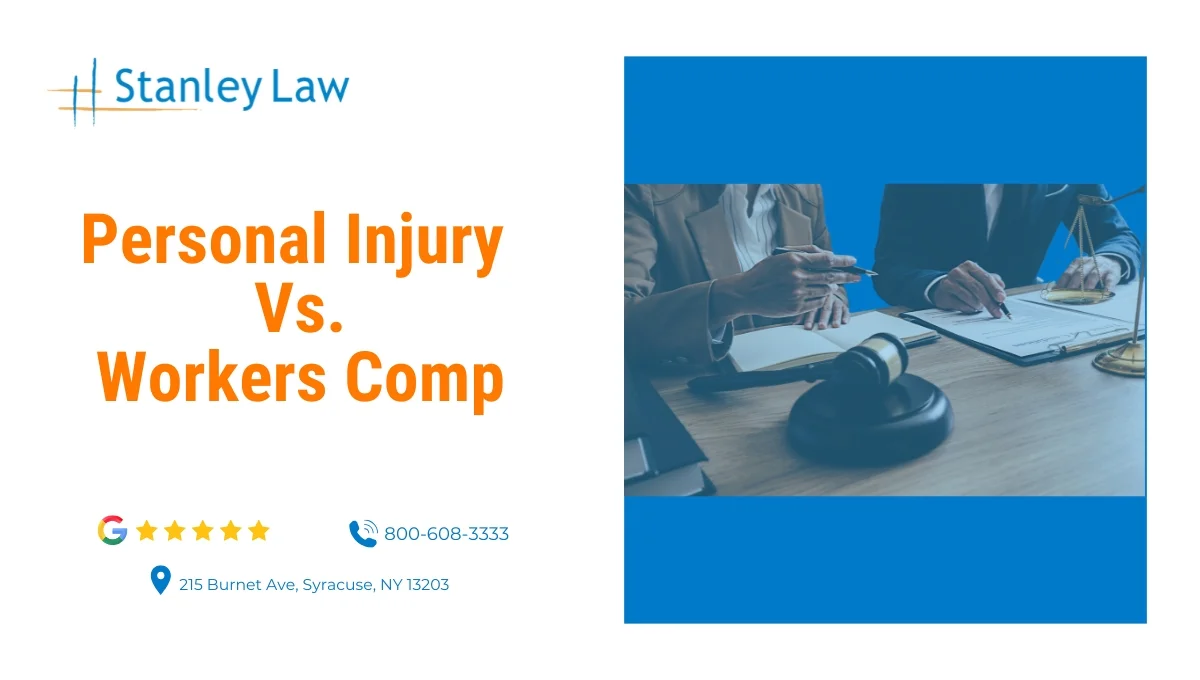It’s common to feel uncertain when choosing between a personal injury claim vs workers’ compensation. Understanding the differences can significantly impact your recovery and financial future. If you’ve suffered an injury, you may be unsure whether to file a personal injury claim or seek workers’ compensation benefits. Many people find the options overpowering. This article will explain the main differences between personal injury claims and workers’ compensation. By the end, you’ll have a clearer understanding of your choices and the steps you can take for recovery, which will help you feel more confident in your decision-making.
Understanding Personal Injury Law and Workers’ Compensation
When dealing with injury claims, it’s essential to understand the differences between personal injury law and workers’ compensation. These two systems operate quite differently, especially regarding fault and the process for obtaining compensation. Knowing the distinctions can help you decide the right path for your situation.
What is Personal Injury Law?
Personal injury law covers cases where someone is harmed by another person’s negligence or intentional actions. Common examples related to the workplace include:
- Slip and fall accidents caused by unsafe conditions
- Assaults at work due to insufficient security
- Injuries from defective equipment due to manufacturer’s negligence
In these cases, proving fault is often necessary, making the claims process more complicated.
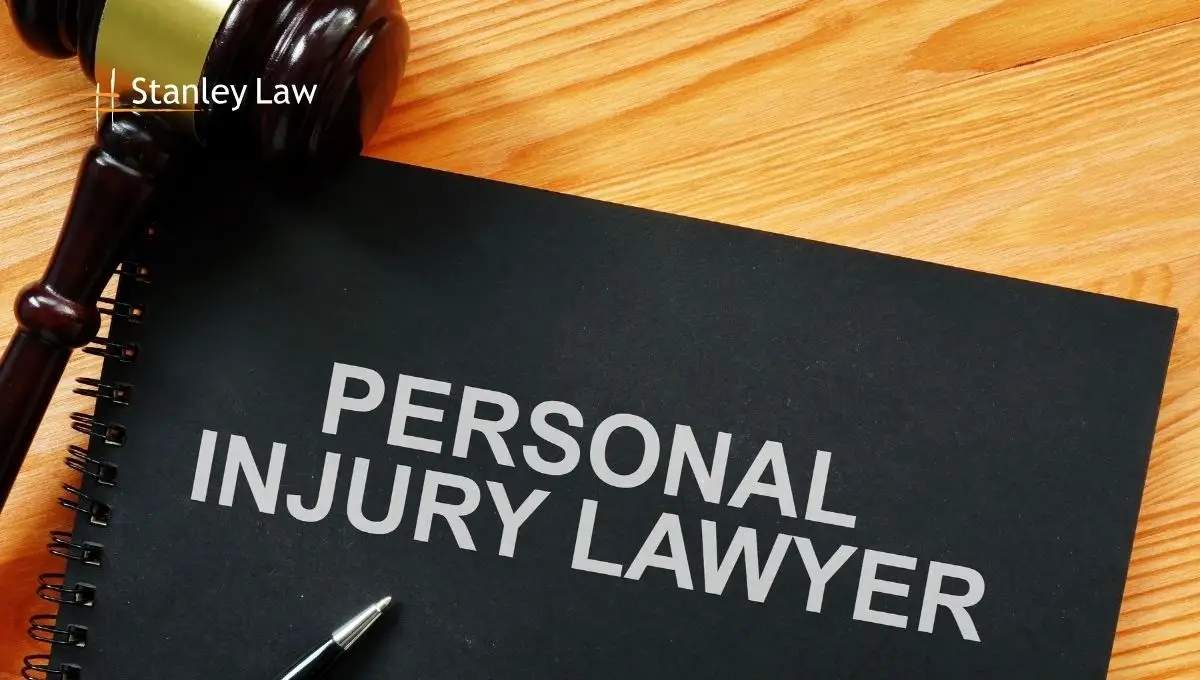
What is Workers’ Compensation?
Workers’ compensation is a system that benefits employees who are injured on the job without requiring them to prove fault. Unlike personal injury claims, this system allows workers to receive compensation regardless of who caused the accident. Key features include:
- Coverage for medical expenses related to work injuries
- Payment for lost wages while recovering
- Benefits for temporary or permanent disabilities
Since workers’ compensation operates on a no-fault basis, claims are generally more straightforward, allowing injured employees to receive compensation efficiently. This simplified approach helps workers and employers manage claims with less legal friction.
Legal Differences: Fault-Based vs No-Fault Claims
The distinction between fault-based and no-fault claims is important in injury cases. In fault-based systems, such as personal injury law, determining who is responsible is crucial for receiving compensation. In contrast, workers’ compensation simplifies the process by providing benefits without requiring proof of fault.
Personal Injury and Negligence
In personal injury claims, proving negligence is key. You must show that the responsible party acted unreasonably, resulting in the injury. To succeed, you typically need to:
- Collect evidence, such as accident reports, photos, and witness statements.
- Prove negligence, directly linking the other party’s actions and your injury.
- Demonstrate damages, such as medical bills, lost wages, or emotional suffering.
These requirements can complicate the claims process, often resulting in prolonged negotiations.
Workers’ Compensation: No-Fault System
Workers’ compensation operates as a no-fault system, offering benefits regardless of who caused the injury. Key features include:
- Immediate access to medical care for work-related injuries without needing to prove fault.
- Compensation for lost wages during recovery.
- Coverage for various work-related injuries, including mental health claims.
This system simplifies the claims process, allowing employees to focus on their recovery while receiving timely support.
Comprehensive Guide to Compensation Options
When pursuing injury-related claims, it’s crucial to understand the various compensation options available to address different aspects of harm. Both personal injury claims and workers’ compensation offer specific benefits that cover medical expenses, lost wages and more. Knowing these options helps you maximize the compensation for your recovery.
Personal Injury Compensation
Covers the financial and non-financial impacts of your injury, including:
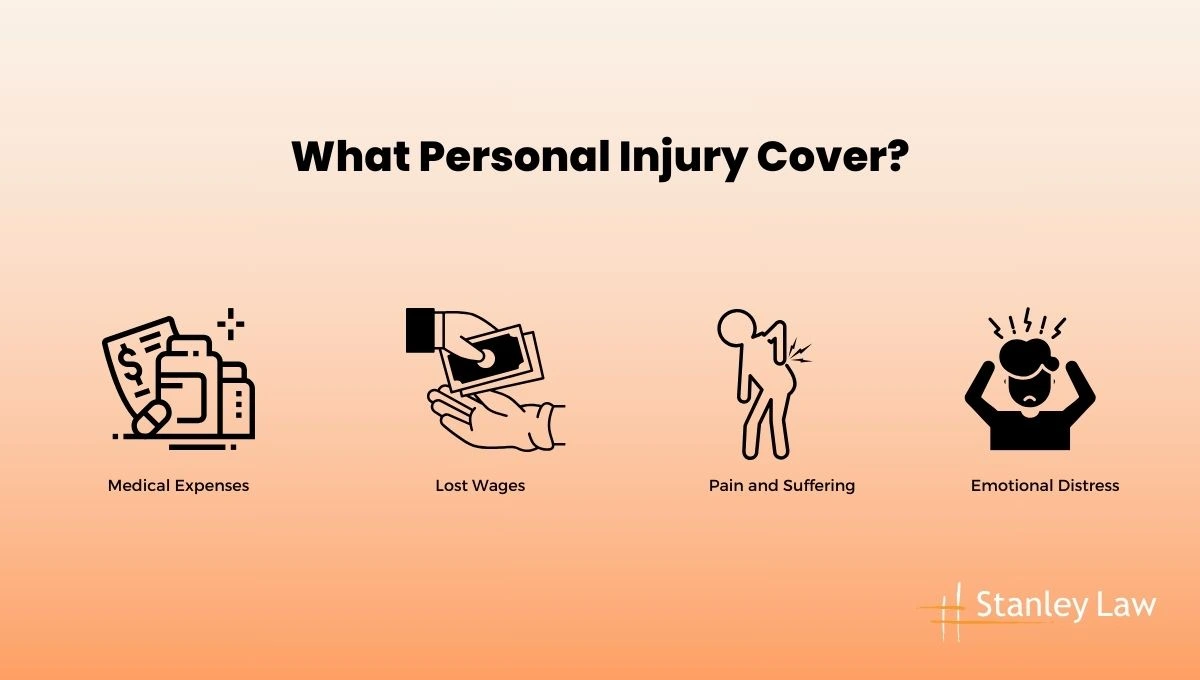
Medical Expenses
Current and future healthcare costs, such as:
- Hospital bills and surgical fees.
- Ongoing treatments, like physical therapy or rehabilitation.
- Prescription medications and medical equipment.
Pain and Suffering
The physical and emotional toll is typically calculated by:
- Assessing the severity of the injury and its long-term effects.
Using a formula that multiplies your medical expenses by a specific factor or relying on a jury’s discretion.
Lost Wages and Future Earnings
Compensation for lost wages and future earnings include:
- Payment for wages lost while unable to work.
- Estimations of future earnings if your injury prevents you from returning to your previous role.
Emotional Distress
For compensation claims for emotional distress, you must demonstrate:
- Significant mental suffering, such as anxiety, depression, or trauma, resulting from the injury.
- Evidence from mental health professionals to support your claim.
Workers’ Compensation Benefits
Workers’ compensation benefits provide a no-fault system of support for injured employees, offering the following:
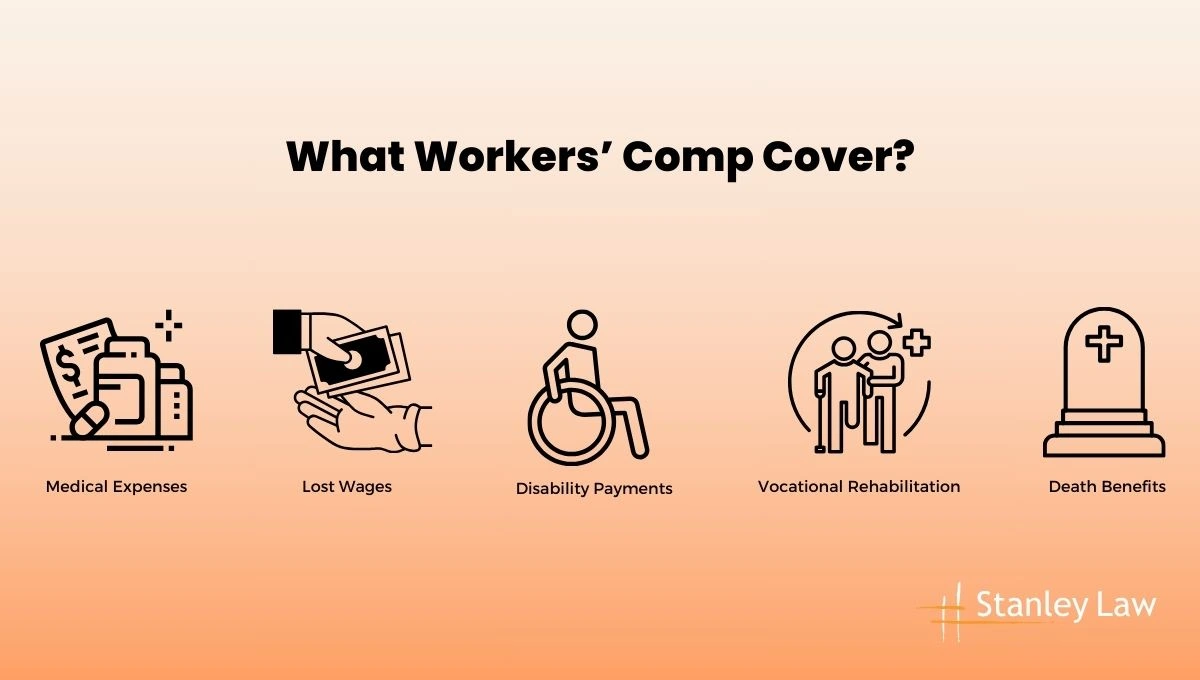
Medical Treatment and Rehabilitation
- Immediate care, such as emergency room visits and surgeries.
- Long-term therapies or rehabilitation that are required for a full recovery.
Wage Replacement (Temporary/Total Disability)
Key aspects of wage replacement benefits include:
- Temporary total disability (TTD) payments for those who cannot work during recovery.
- Temporary partial disability (TPD) benefits for employees who can work but in a limited capacity.
Disability Payments
Ongoing disability payments include:
- Benefits based on the severity and type of disability.
- Regular payments that reflect your average weekly wages.
Vocational Rehabilitation
Vocational rehabilitation services that support injured employees in returning to work include:
- Job retraining programs to develop new skills.
- Educational opportunities to qualify for a new role.
Death Benefits (if applicable)
In cases of work-related fatalities, death compensation for dependents covers:
- Lost income that the family would have relied on.
- Coverage for funeral expenses.
Filing Claims: What Employers and Injured Workers Need to Know
Managing the claims process can be complex for both employers and injured workers. Knowing the necessary steps for filing claims helps ensure that all parties are informed and prepared for workplace injuries.
Personal Injury Lawsuits
Filing a personal injury lawsuit following a workplace injury involves several critical steps:
- Consult a Lawyer: Assess case viability and discuss potential compensation.
- Gather Evidence: Collect key documents, including medical records, witness statements, and accident reports.
- File the Complaint: Submit the lawsuit to the appropriate court, outlining the claim’s basis.
- Discovery Phase: Exchange evidence between parties to prepare for trial or settlement.
- Trial or Settlement: If a case doesn’t settle, proceed to trial to resolve the case.
Workers’ Compensation Claims Process
The workers’ compensation claims process requires specific steps from both employers and injured workers:
- Workers’ Comp Eligibility: Confirm eligibility for benefits under workers’ compensation laws.
- Reporting the Injury:
- Worker: Immediately notify the employer after the injury occurs.
- Employer: Document the incident and report the injury to the insurance carrier.
- Seeking Medical Attention: Get necessary treatment, including for work-related mental health claims.
- Filing the Claim:
- Worker: Complete and submit the required claim forms.
- Employer: Assist the worker in the claims process.
- Claim Review: Insurance carriers evaluate the claim and may request additional information.
- Receiving Benefits: Start receiving approved benefits, including temporary and permanent disability claims.
Can You File Both Personal Injury and Workers’ Compensation Claims?
In certain cases, injured workers can pursue both claims:
- Third-Party Claims: File a personal injury claim against a third party while claiming workers’ comp benefits.
- Exclusive Remedy Rule: Understand that workers’ compensation is usually the only remedy against the employer.
- Consult Legal Experts: Seek advice to determine the best course of action based on the specific circumstances.
Knowing these options helps injured workers seek all types of compensation that fit their situation.
Why Legal Representation Matters
Having skilled legal representation is critical for injured workers and individuals pursuing personal injury vs. workers’ compensation claims. An experienced attorney ensures clients understand their rights, face the claims process efficiently, and secure the compensation they deserve. Claimants may need legal guidance to overcome challenges such as denied claims or undervalued settlements.

Personal Injury Lawyers: How They Help
Personal injury lawyers play a key role in maximizing compensation for their clients. They provide expert legal counsel and manage every step of the process to ensure the best possible outcome, including:
- Assessing Case Viability: Lawyers determine if the case is worth pursuing.
- Gathering Evidence: Personal injury attorneys collect necessary documents, medical records, and witness statements.
- Calculating Damages: They identify the total damages, including medical expenses, lost wages, and emotional distress.
- Negotiating Settlements: Attorneys negotiate directly with insurance companies for fair compensation.
- Representing in Court: Lawyers represent their clients during trial if a case doesn’t settle.
Workers’ Compensation Attorneys: What to Expect
NY Workers’ Compensation attorneys assist clients in understanding their rights and handling the claims process efficiently. They help by:
- Evaluating Eligibility: Attorneys confirm the injured worker’s eligibility for benefits.
- Assisting with Paperwork: Workers’ comp lawyers help clients accurately complete and submit claim forms.
- Ensuring Compliance: Lawyers ensure meeting all legal requirements and deadlines.
- Handling Disputed Claims: They represent clients in disputes about benefits and assist with appeals for denied claims.
- Providing Ongoing Support: Lawyers guide throughout the claims process, including understanding rights and options.
Learn when to hire workers’ compensation lawyer in our other blog, “When to hire workers’ compensation lawyer?“
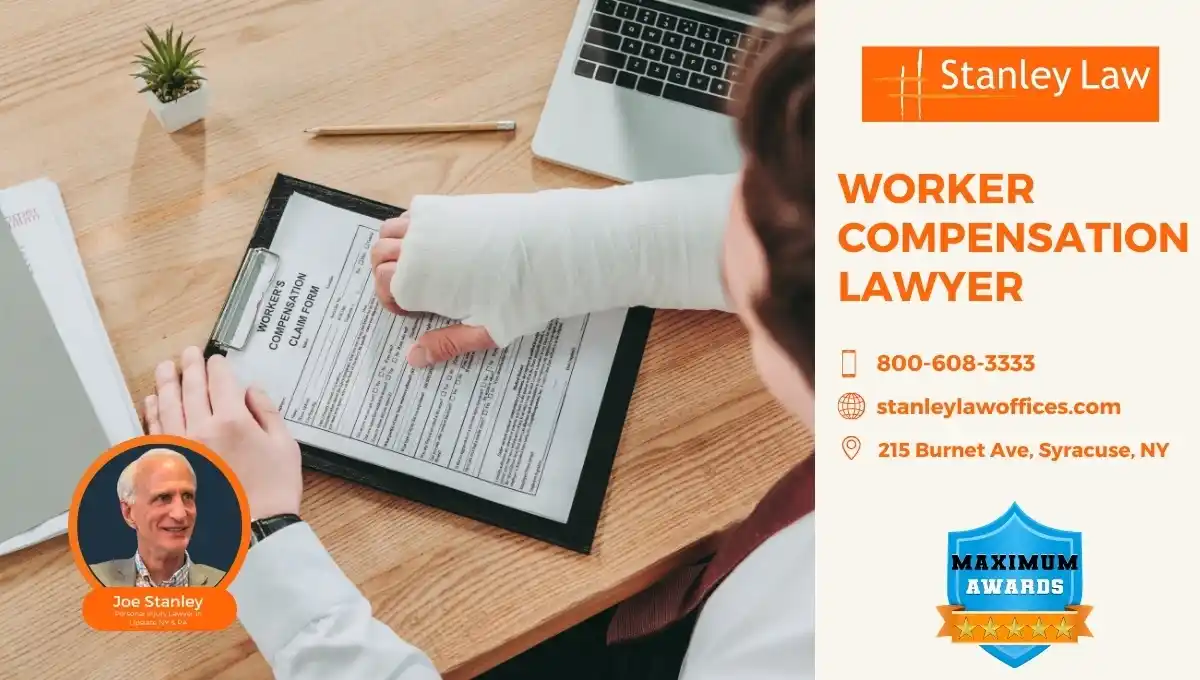
Conclusion
Understanding the differences between personal injury vs. workers’ compensation claims is crucial for injured workers and employers. It helps protect rights and secure deserved compensation. Knowing these processes allows you to take the right steps in your claim and prepares you for any challenges. It’s important to seek legal advice when needed. Experienced representation can maximize compensation, ensure compliance, and guide you through complex claims. Informed decisions lead to better outcomes and provide necessary support during tough times.
If you face a workplace injury or consider a personal injury claim, don’t hesitate to consult a qualified attorney. They can help you pursue the compensation you deserve and clarify your rights.
Contact Stanley Law Office for free consultation.
Frequently Asked Questions – Personal Injury vs Workers Comp
Can Independent Contractors File for Workers’ Compensation or Personal Injury?
No. Independent contractors usually do not qualify for workers’ compensation. However, they can file personal injury claims if injured due to someone else’s negligence.
What Are the Time Limits for Filing a Personal Injury or Workers’ Compensation Claim?
Time limits, or statutes of limitations, vary by state. According to the US Department of Labor, you must file a personal injury or workers’ compensation claim within three years of the injury.
How Do Pre-existing Conditions Affect Workers’ Compensation Claims?
Pre-existing conditions can complicate workers’ compensation claims but do not automatically disqualify you. The key is whether the work-related injury aggravated the existing condition.
Are Mental Health Issues Covered Under Workers’ Compensation?
Yes. Mental health issues, such as stress from job duties or a workplace injury, are covered under insurance if they are work-related. Documentation is crucial.
Can I Get Workers’ Compensation and Personal Injury Damages if the Injury Happens Off-Site?
Yes. You can receive workers’ compensation and personal injury damages for off-site injuries related to your job duties.
What if My Employer Doesn’t Have Workers’ Comp Insurance?
Accordion You can still pursue a claim if your employer doesn’t have workers’ comp insurance. Where applicable, you can file a personal injury lawsuit against your employer or seek state-provided benefits.

